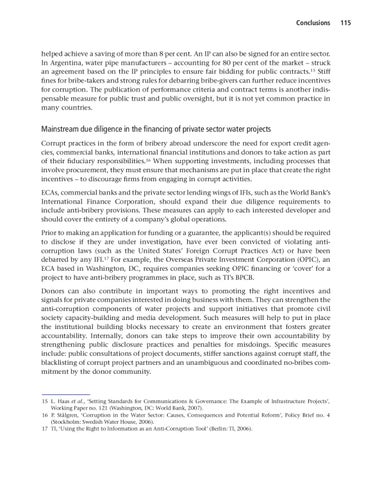Conclusions
helped achieve a saving of more than 8 per cent. An IP can also be signed for an entire sector. In Argentina, water pipe manufacturers – accounting for 80 per cent of the market – struck an agreement based on the IP principles to ensure fair bidding for public contracts.15 Stiff fines for bribe-takers and strong rules for debarring bribe-givers can further reduce incentives for corruption. The publication of performance criteria and contract terms is another indispensable measure for public trust and public oversight, but it is not yet common practice in many countries.
Mainstream due diligence in the financing of private sector water projects Corrupt practices in the form of bribery abroad underscore the need for export credit agencies, commercial banks, international financial institutions and donors to take action as part of their fiduciary responsibilities.16 When supporting investments, including processes that involve procurement, they must ensure that mechanisms are put in place that create the right incentives – to discourage firms from engaging in corrupt activities. ECAs, commercial banks and the private sector lending wings of IFIs, such as the World Bank’s International Finance Corporation, should expand their due diligence requirements to include anti-bribery provisions. These measures can apply to each interested developer and should cover the entirety of a company’s global operations. Prior to making an application for funding or a guarantee, the applicant(s) should be required to disclose if they are under investigation, have ever been convicted of violating anticorruption laws (such as the United States’ Foreign Corrupt Practices Act) or have been debarred by any IFI.17 For example, the Overseas Private Investment Corporation (OPIC), an ECA based in Washington, DC, requires companies seeking OPIC financing or ‘cover’ for a project to have anti-bribery programmes in place, such as TI’s BPCB. Donors can also contribute in important ways to promoting the right incentives and signals for private companies interested in doing business with them. They can strengthen the anti-corruption components of water projects and support initiatives that promote civil society capacity-building and media development. Such measures will help to put in place the institutional building blocks necessary to create an environment that fosters greater accountability. Internally, donors can take steps to improve their own accountability by strengthening public disclosure practices and penalties for misdoings. Specific measures include: public consultations of project documents, stiffer sanctions against corrupt staff, the blacklisting of corrupt project partners and an unambiguous and coordinated no-bribes commitment by the donor community.
15 L. Haas et al., ‘Setting Standards for Communications & Governance: The Example of Infrastructure Projects’, Working Paper no. 121 (Washington, DC: World Bank, 2007). 16 P. Stålgren, ‘Corruption in the Water Sector: Causes, Consequences and Potential Reform’, Policy Brief no. 4 (Stockholm: Swedish Water House, 2006). 17 TI, ‘Using the Right to Information as an Anti-Corruption Tool’ (Berlin: TI, 2006).
115
